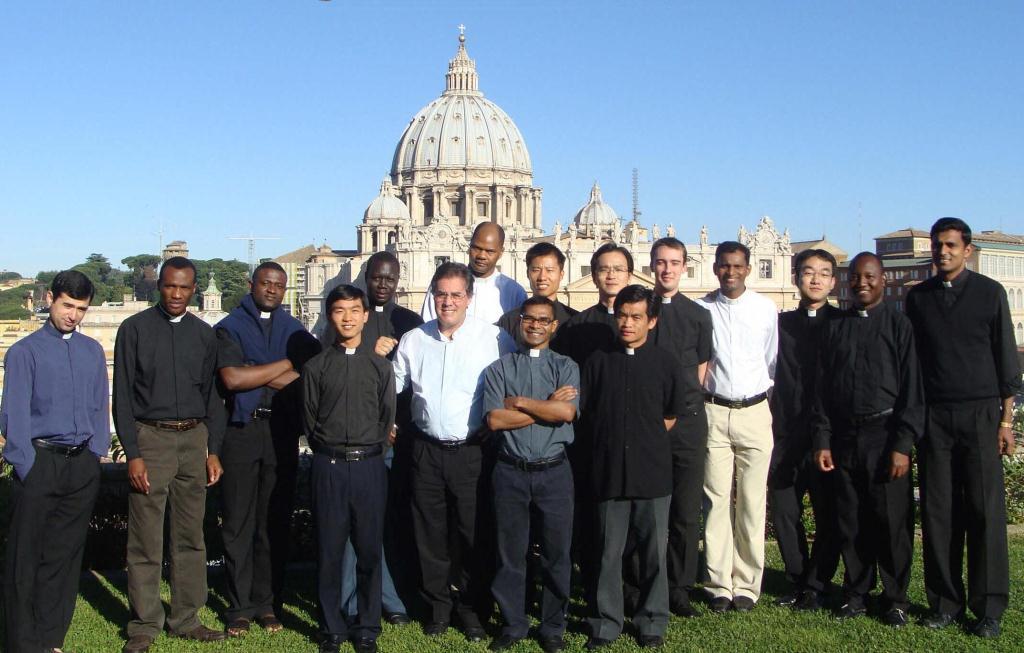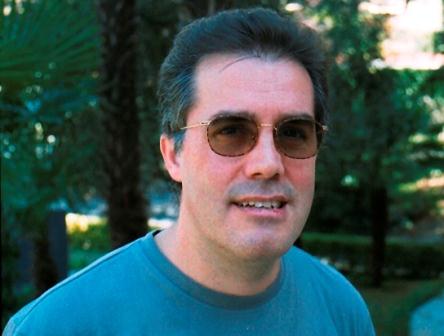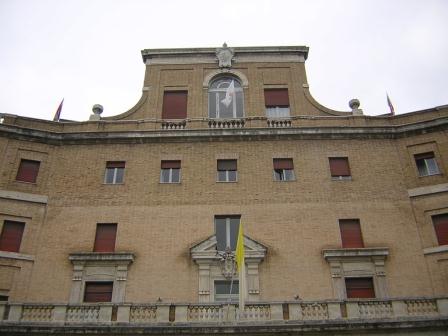Daniel Comboni
Comboni Missionaries
Institutional area
Other links
Newsletter
Rome, Monday, October 8 2012
Fr. Fernando Domingues, 53, is the Rector of the Pontifical College Urbanianum in Rome. “We try to cultivate in our seminarians a strong missionary spirit, that man become the leaven in their own dioceses,” says the Portuguese Comboni Missionary, rector of the college since 2005.Currently the Urbanianum has about 160 seminarians from Asia, Africa, Oceania, Middle East and Latin America. We have interviewed Fr. Domingues.
Every year a consistent group of seminarians of the young Churches is sent to Rome by their respective bishops to perfect their studies and then return to the local Churches of origin with a sizeable pastoral and cultural baggage. Their point of arrival is the Pontifical College Urbanianum of the Congregation for the Evangelization of Peoples, historically known as “De Propaganda Fide.” The college was founded in Rome in 1622 with the idea of forming missionaries to be sent to the entire world. The students who enter the Urbanianum follow the studies leading to priestly ordination and then return to their country of origin. The period of preparation to the priesthood lasts 5 or 6 years, during which time all of basic theology is studied, and in some cases also specializations, besides the study of languages. To be admitted knowledge of Italian is necessary, plus completion of two years of philosophy and the introduction of one’s bishop.
The current formation staff is made up of Fr. Domingues, Rector, together with Fr. Joachim Agligab (Benin), Fr. Rocco Huang (China), Fr, Agostino Tri (Indonesia) and Fr, Henry Falcao (India). Of the spiritual directors, one comes from Malta (Once a missionary in Libya), another is from Germany (one a missionary in China), then others from Italy, India, Vietnam and Togo. The bursar is Italian. The Urbanianum depends directly from the Congregation of the Evangelization of Peoples which since May 10 2011 has as its Prefect H. E. Card. Fernando Filoni.
When was the Urbanianum founded and with what objectives?
The Pontifical College Urbanianum was founded in the 17th century by Pope Urban 8th with the precise aim of preparing priests who would be ready to go to areas where it is was more necessary to announce the Gospel. It is therefore a ‘missionary seminary from its very origin. Another reason, always present from the beginning and valid up to today, is that of cultivating communion among the various ecclesial traditions in communion with the Holy Father. Thus there has always been the presence of seminarians belonging to the Catholic Churches of Oriental Rites, coming from Eastern Europe and from the Countries of the Middle East and from India. Currently, beside our Latin rite, we have seminarians of Chaldean rite (Iraq), Coptic (Egypt), Maronite (Israel), Syro-Antiochian (Irak), Sir-Malabarese and Siro-Malankarese (India). We celebrate the liturgy not only according to the Roman Rite, but often also in the other Rites of the Catholic Church.
Among the aims of the Urbanianum there has always been the formation of seminarians coming from the new Churches born of the missionary effort. Thus it is clear that each Church is called to be missionary from the very first days of its life. I want to remember, in this respect, the example of Saint Daniel Comboni, bishop and founder of the Church in the Sudan, who already in the days of first evangelization of those lands, sent to this college a Sudanese seminarian. Today we try to cultivate in our seminarians a strong missionary spirit, so that, when they return to their Churches, they will cultivate a strong spirit of evangelization.
We strive also to cultivate a feeling of robust identification with the catholicity of the Church, respecting and promoting the characteristics proper to the ecclesial traditions from which our seminarians come. They will thus be able to live according to the diversity existing in the Church as the source of a mutual enrichment and not as a danger to communion.
Where do the seminarians come from and where do they study?
This year which we have just begun the Urbanianum has 160 seminarians coming from Asia, Africa, Oceania, the Middle East and Central America. The nations represented are 31; the larger national groups are India (34), China (18) and Vietnam (15). Other countries with significant numbers are Cameroun (11), Korea (7), Uganda (9), Congo (9) and Pakistan (8). All our seminarians study theology at the Urbaniana University, well known for its specific missionary aim and it is also in this University that they follow the various courses of specialization in view of obtaining Canonical License in areas of study such as Missiology, Philosophy, Theology, Canon Law, Scriptures. Al of these specializations will be greatly useful for the pastoral life of their Churches of origin and above all for the formation of their seminaries.
What is your job as Rector of the College?
Besides the general responsibility for the running of the entire formation program like in all seminaries, in this seminary in particular it is my commitment to cultivate both in the seminarians and in the group of formators a climate of fraternity and of serene cooperation that will respect the differences and make then source of a challenge and enrichment for all. The presence of representatives from various Catholic rites is also a golden opportunity for making known the great variety and richness of spiritual and liturgical traditions present with great vitality in the Catholic Church. Finally, cultivating the communication and the frequent cooperation with the seminarians’ bishops I try to maintain alive in them the feeling of belonging to their own Church of origin. It is also part of my service to organize the rotation of formators who serve in our community for periods varying from 5 to 7 years. These, returning to their respective dioceses, will be a presence that will promote in the seminaries and the dioceses in general the spirit of the Catholic and missionary community which we live together here.
The Prefect for the Congregation for the evangelization of Peoples, H. E. Card. Fernando Filoni, has given some formative or pastoral indications to the College?
I am very happy that both the cardinal and the Archbishop Secretary, H. E. Savio Hon Tai-Fai, follow closely the life of the seminary. At the beginning of this year in the course of a very cordial meeting with the entire group of formators, they invited us to continue with courage on the road we are on: Orthodoxy – deep study of the history and content of faith, with a spirit of great fidelity to the Tradition of the Church and the official teaching of its shepherds, looking with courage to the challenges that the Church is facing these days. Another dimension they are asking to cultivate: human and Christian virtues.
The Church needs priests with well balanced personalities, rich in humanity and Christian values. Finally, they encouraged us to continue on the line of a spiritual life which is rich and deep that will express itself in a liturgy celebrated properly and with a deep spirit of faith where the mystery is made present in the way we celebrate. The insertion of seminarians and formators in the concrete life of the Church in Rome is another dimension that we cannot forget.
Are there particular initiatives that the College promotes during this mission month and in particular on the occasion of World Mission Sunday?
During the entire year, the group of seminarians particularly in charge of mission promotion of the entire community organizes initiatives to make known the various churches present at the college and offers to all regular information over concrete initiatives or important moments lived in those Churches and in missionary contexts. Specifically in October the Saturday before World Mission Sunday we organize, together with colleges of priests and sisters, a vigil of prayer and missionary reflection. On Mission Sunday we begin our regular presence in about 20 parishes and other ecclesial entities – initiatives to help the poor, the sick, and the immigrants – in the city of Rome.
Are there many bishops around the world who have studied at the Collegio Urbanianum?
Often many alumni come by, among them bishops, cardinals, patriarchs… who return with joy here where have been formed to the priestly ministry. Last September, 31 of these alumni came to live here for a week. They had been ordained in 1972. Even this type of initiative, which we joyfully accept, helps to cultivate ecclesial communion in this great missionary family which is the Collegio Urbanianum.
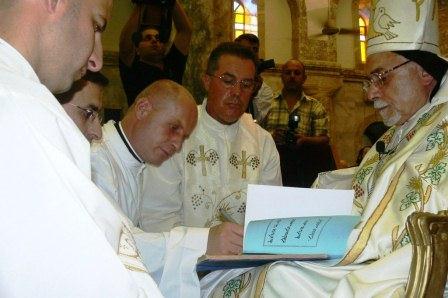
Fr. Fernando Domingues takes part in the priestly ordination – in the Siro-Antiochian Rite –
of a student from Iraq of the collegium Urbanianum, in North Iraq, 2011.
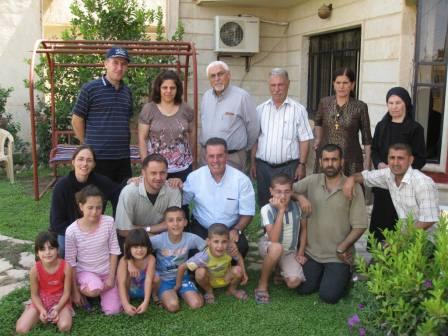
Fr. Fernando Domingues with the family of a seminarian fron Iraq
of the Collegio Urbanianum, in North Irak, 2011.

